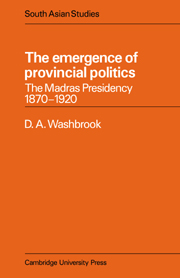Book contents
- Frontmatter
- Contents
- Preface
- Abbreviations, notes on references and spelling
- Introduction
- 1 The Madras Presidency
- 2 The governance of Madras
- 3 The political economy of Madras
- 4 Local structures of political power
- 5 The emergence of provincial politics
- 6 The vocabulary of communal politics
- 7 The Home Rule League, Justice Party and Congress
- Conclusion
- Glossary
- Bibliography
- Index
7 - The Home Rule League, Justice Party and Congress
Published online by Cambridge University Press: 21 September 2009
- Frontmatter
- Contents
- Preface
- Abbreviations, notes on references and spelling
- Introduction
- 1 The Madras Presidency
- 2 The governance of Madras
- 3 The political economy of Madras
- 4 Local structures of political power
- 5 The emergence of provincial politics
- 6 The vocabulary of communal politics
- 7 The Home Rule League, Justice Party and Congress
- Conclusion
- Glossary
- Bibliography
- Index
Summary
The previous chapters have brought us to some understanding of the processes of political change in Southern India between the 1870s and 1916. Those processes were all moving in the same direction. They were linking together the political institutions and political interests of a previously segmented political system. By 1917 the linkages were complete and, although provincial and local systems had by no means merged entirely into each other and although further changes in their relationship would take place, they were now inextricably connected. In the Introduction, we set ourselves a main task: to explain the major political events of 1917–20. Already, we have set the stage for them and have suggested reasons for their occurrence and for their massive significance. Particular lines of conflict were being drawn by the way that the political system was evolving, and the confrontations of 1917–20 represented the first large-scale conflict in the newly integrated system. It remains for us to go through the events of these years to make our suggestions concrete. We must show how the Home Rule League, non-Brahman movement and Congress, as they developed at this time, were the products of their new institutional environment and how, indeed, their development is inexplicable without reference to the processes of political change which we have been examining.
By the end of the second year of the First World War, Mylapore had abandoned its policy of constitutional co-operation with the British and had adopted an agitational posture similar to that of the 1880s.The conditions of the period were perfect for it to press its imperial overlords into a further devolution of power.
- Type
- Chapter
- Information
- The Emergence of Provincial PoliticsThe Madras Presidency 1870–1920, pp. 288 - 329Publisher: Cambridge University PressPrint publication year: 1976



